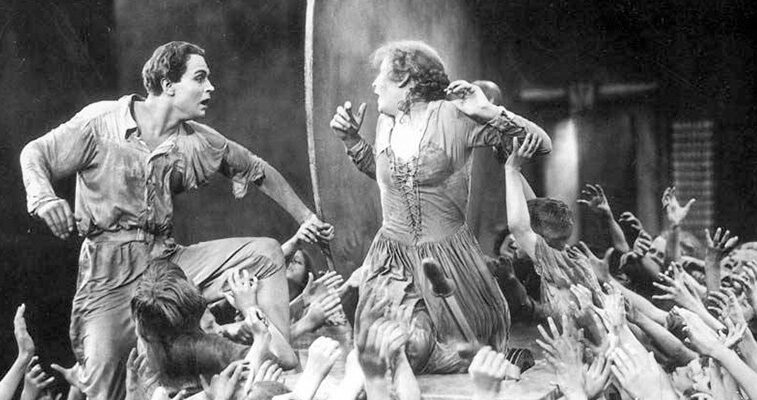[10]
Fritz Lang directed and Thea von Harbou scripted this grandfather of science-fiction films about violent class warfare in a futuristic city. The hero of Metropolis is Freder (Gustav Fröhlich), a privileged playboy who enjoys a life of luxury until a chance encounter with the beautiful Maria (Brigitte Helm) brings him to discover the city’s entire working class is living in the harsh underground to keep the city’s machinery running. Maria prophesizes that a ‘mediator of the heart’ will soon arrive to help join the city’s ‘hands’ with its ‘head’. Freder picks up the mantle and runs to his father (Alfred Abel), the city’s founder, for help. But when his father learns about Maria’s preachings, he teams with a mad scientist named Rotwang (Rudolf Klein-Rogge) to quell any stirrings of rebellion. Rotwang kidnaps Maria and replaces her with an evil doppelganger who instigates pandemonium and brings the city to the brink of destruction.
Metropolis is a two-and-a-half hour silent film over ninety years old, but it moves like it was made yesterday. Its thematic explorations make it a thing of academic fancy, and after all this time, not a single notion lacks relevancy — class warfare, technological terror, corporate apathy, and the Madonna/whore complex chief among them.
And while Von Harbou delivers the content, Lang delivers the style. The pioneering special effects and lavish production design threw down the gauntlet and filmmakers have been paying homage ever since. The film editing pushes the envelope at times, never more so than when the evil Maria robot performs a lascivious dance before a myriad tuxedoed men. Lang shows quick flashes of Maria’s gyrating body against extreme close-ups of the men’s eyes. I’ve never seen a movie whip up more sexual frenzy.
Other highlights include Freder’s fever dream, in which the Seven Deadly Sins come to life and Death swipes his blade across the screen, and Freder and Maria’s emotionally gripping rescue of the working-class’s children from an underground flood.
Over the years, more and more lost footage has been located and restored to Metropolis, adding to its run time and threatening its streamlined narrative. While the new footage is interesting, I don’t think you lose much by watching an older, shorter incarnation of the movie.
Few silent films enjoy the shelf life this one still has. Both prescient and timeless, escapist and academic, visually sumptuous and emotionally engaging — Metropolis won’t be giving up the crown any time soon.


